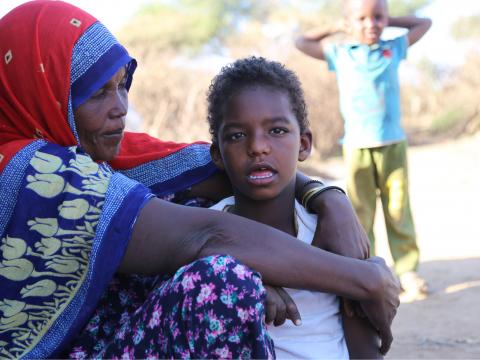World Vision's community feedback mechanism benefits children with disability

Whenever you would meet Sacad, a young boy from Somaliland, he was not happy because he couldn’t be able support himself without someone else's help. The seven-year-old would often wonder why he couldn’t walk like other children his age. He became physically challenged just a few days after birth, as his mother recounts.
“Sacad got sick two days after birth. He started shaking non-stop, and this eventually led to a comma. Since then, his situation has not changed. I took him to a hospital in Hargeisa where a doctor (neurologist) prescribed some medication for him. I gave him the medicine every day but nothing changed. I just hope one day he’ll recover.” she says.
Life is not easy for young Sacad. Living in Dacarta Village –80 kilometres Southwest of Hargeisa–. Sacad, just like other children with disabilities living in nomadic areas, faces many challenges. Unable to walk, eat, or use his hand, some of the barriers that hinder his development include limited accessibility, lack of educational facilities to support the disabled and insufficient teaching skills, in addition to physical and environmental hazards. Others are livelihood and economic challenges, negative attitudes, discrimination, stigma and a severe shortage of assistive devices including mobility aids.
Most of these challenges make life especially harder for parents who have children with disabilities in rural fragile contexts grappling with poverty, lack of proper health facilities or access to specialised healthcare, poor or no family economic income and lack of awareness on disability.
“Sacad cannot talk or walk,” his mother tells us. “He cannot go to the toilet, eat or bath by himself. He needs my support throughout, I am not able to do my other house chores because of him. As he grows, it’s getting harder for me to assist him. I used to carry him to town or to the hospital but he started to get heavy, and I was forced to use a wheelbarrow.” she explains with sadness.
Thanks to World Vision’s Interactive Voice Response (IVR) feedback system, eight children (including Sacad) and an elderly man with disabilities now have a new reason to smile. Through the initiative, the beneficiaries who all live in rural areas received wheelchairs, an elbow cane and walking frame in November 2020 to enable them move around with ease.
“This wheelchair will help me to move him easily around the home, when we are going to the city and to the hospital if needed. Thanks to World Vision for the support, it's very helpful to my son.” Sacad’s mother happily says.
As a child-focused organisation, World Vision recognises the importance of supporting children/people with disabilities in particularly rural areas, as they are often some of the most vulnerable in these communities. World Vision focuses on ensuring inclusion of those with disability in all its programming.
The benefit of World Vision's Community Feedback System
In June, Muhiyadin, a member of Dacarta Village community members group, called World Vision's toll-free IVR number (364) and requested for wheelchairs from organisations to children and adults with disabilities in need of assistance including provision of walking frames, wheelchairs and elbow canes.
Following an assessment visit to the location, World Vision in partnership with the Somaliland Disability Action Network (DAN) supported the children and elderly with disabilities who were in need of wheelchairs, an elbow cane and a walking frame.
After receiving the wheelchairs, parents and local community members appreciated the support by sending their feedback through World Vision Community Feedback platforms. “After seeing the impact of my simple call to the IVR system. I want to praise World Vision for being a role model to the community feedback and response mechanism.” Muhayadin shares.